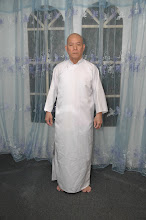Singapore time 10.09 am 13th April 2008
Chapter 1
Learned Audience, our Essence of Mind (literally, self-nature) which is the seed or kernel of enlightenment (Bodhi) is pure by nature, and by making use of this mind alone we can reach Buddha-hood directly. [The Chinese word for Essence of Mind is 'sing'. This is used in Confucianism and Taoism oftenly. It should be self-nature.]
"May I tell Your Holiness," said I, "that Prajna (transcendental Wisdom) often rises in my mind. When one does not go astray from one's own Essence of Mind, one may be called the 'field of merits.' I do not know what work Your Holiness would ask me to do?"
'Our body is the Bodhi-tree, And our mind a mirror bright. Carefully we wipe them hour by hour, And let no dust alight.' [stanza written by chief monk.]
'All forms or phenomena are transient and illusive.'
'There is no Bodhi-tree, nor stand of a mirror bright. Since all is void, where can the dust alight?' [stanza spoken by Hui Neng]
When he came to the sentence, "One should use one's mind in such a way that it will be free from any attachment," I at once became thoroughly enlightened, and realized that all things in the universe are the Essence of Mind itself.
all things are the manifestation of the Essence of Mind!"
Knowing that I had realized the Essence of Mind, the Patriarch said, "For him who does not know his own mind, there is no use learning Buddhism. On the other hand, if he knows his own mind and see intuitively his own nature, he is a Hero, a 'Teacher of gods and men,' 'Buddha'."
"When the Patriarch Bodhidharma first came to China, most Chinese had no confidence in him, and so this robe was handed down as a testimony from one Patriarch to another. As to the Dharma, this is transmitted from heart to heart, [by Sealing the Mark on our forehead.]and the recipient must realize it by his own efforts. From time immemorial it has been the practice for one Buddha to pass to his successor the quintessence of the Dharma, and for one Patriarch to transmit to another the esoteric teaching from heart to heart. As the robe may give cause for dispute, you are the last one to inherit it. Should you hand it down to your successor, your life would be in imminent danger. (a change of order to transmit Dharma to many) Now leave this place as quickly as you can, lest some one should do you harm."
I said "When you are thinking of neither good nor evil what is at that particular moment, Venerable Sir, your real nature (literally, original face)?"
"What I can tell you is not esoteric," I replied. "If you turn your light inwardly, you will find what is esoteric within you."
"There are two kinds of 'element of goodness,' the eternal and non-eternal. Since Buddha-nature is neither eternal nor non-eternal, (something like void-ness, but it is better to refer to as eternal) therefore their 'element of goodness' is not eradicated. Now Buddhism is known as having no two ways. There are good ways and evil ways, but since Buddha-nature is neither, therefore Buddhism is known as having no two ways. From the point of view of ordinary folks, the component parts of a personality (skhandhas) and factors of consciousness (Dhatus) are two separate things; but enlightened men understand that they are not dual in nature. Buddha-nature is non-duality."
Sunday, 13 April 2008
Subscribe to:
Post Comments (Atom)

No comments:
Post a Comment